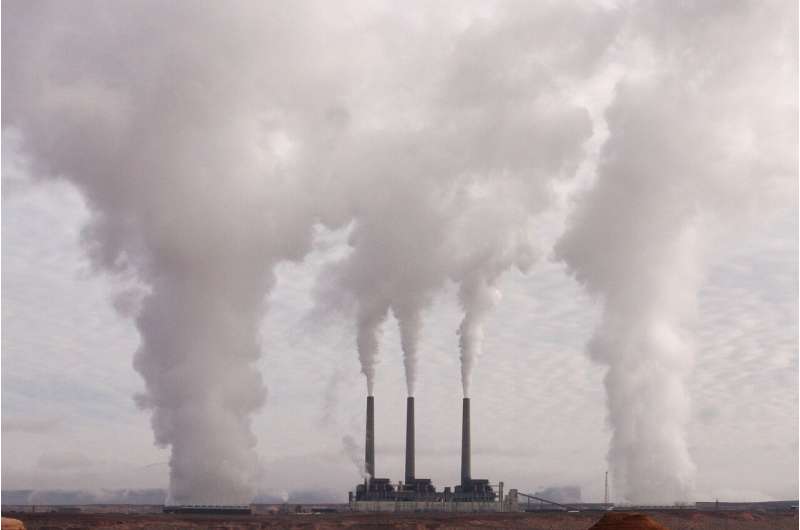This article has been reviewed according to Science X's editorial process and policies. Editors have highlighted the following attributes while ensuring the content's credibility:
fact-checked
peer-reviewed publication
trusted source
written by researcher(s)
proofread
Carbon budget for 1.5°C will run out in six years at current emissions levels, says new research

If humanity wants to have a 50/50 chance of limiting global warming to 1.5°C, we can only emit 250 another gigatons (billion metric tons) of CO2. This effectively gives the world just six years to get to net zero, according to calculations in our new paper published in Nature Climate Change.
The global level of emissions is presently 40 gigatons of CO2 per year. And, as this figure was calculated from the start of 2023, the time limit may be actually closer to five years.
Our estimate is consistent with an assessment published by 50 leading climate scientists in June and updates with new climate data many of the key figures reported by the Intergovernmental Panel on Climate Change (IPCC) in August 2021.
How much CO2 can still be emitted while remaining under a certain level of warming is referred to as the "carbon budget." The carbon budget concept works because the increase in Earth's global mean surface temperature has increased in a linear fashion with the total amount of CO2 people have emitted since the industrial revolution.
The other side of this equation is that, roughly speaking, warming stops when CO2 emissions stop: in other words, at net zero CO2. This explains why net zero is such an important concept and why so many countries, cities, and companies have adopted net zero targets.
We revised the remaining carbon budget down from the 500 gigatons reported by the the IPCC from the start of 2020. Some of this revision is merely timing: three years and 120 gigatons of CO2 emissions later, the world is closer to the 1.5°C threshold. Improvements we made to the method for calculating budget adjustments shrank the remaining budget further.
Clearing the air
Alongside CO2, humanity emits other greenhouse gases and air pollutants that contribute to climate change. We adjusted the budget to account for the projected warming caused by these non-CO2 pollutants. To do this, we used a large database of future emissions scenarios to determine how non-CO2 warming is related to total warming.
Some of the warming caused by greenhouse gases is offset by cooling aerosols such as sulfates—air pollutants that are emitted along with CO2 from car exhausts and furnaces. Almost all emissions scenarios project a reduction in aerosol emissions in the future, regardless of whether fossil fuels are phased out or CO2 emissions continue unabated. Even in scenarios where CO2 emissions increase, scientists expect stricter air quality legislation and cleaner combustion.
In its most recent report, the IPCC updated its best estimate of how much air pollution cools the climate. As a result, we expect that falling air pollution in future will contribute more to warming than previously assessed. This reduces the remaining 1.5°C budget by about another 110 gigatons.
Other updates we made to the carbon budget methodology tend to reduce the budget even more, such as projections of thawing permafrost that were not included in earlier estimates.
All is not lost
It is important to stress that many aspects of our carbon budget estimate are uncertain. The balance of non-CO2 pollutants in future emissions scenarios can be as influential on the remaining carbon budget as different interpretations of how the climate is likely to respond.
We also do not know for sure whether the planet will really stop warming at net zero CO2 emissions. On average, evidence from climate models tends to suggest it will, but some models show substantial warming continuing for decades after net zero is reached. If further warming after net zero is the case, the budget would be further reduced.
These uncertain factors are why we quote a 50/50 likelihood of limiting warming to 1.5°C at 250 gigatons of CO2. A more risk-averse assessment would report a two-in-three chance of staying under 1.5°C with a remaining budget of 60 gigatons—or one-and-a-half years of current emissions.
Time is running out to limit global heating to 1.5°C above pre-industrial levels. While we have revised the remaining carbon budget, the message from earlier assessments is unchanged: a dramatic reduction in greenhouse gas emissions is necessary to halt climate change.
It looks less likely that we will limit warming to 1.5°C, but this does not mean that we should give up hope. Our update also revised the budget for 2°C downwards relative to the IPCC's 2021 estimate, but by a smaller amount—from 1,350 to 1,220 gigatons, or from 34 to 30 years of current emissions. If current national climate policies are fully implemented (admittedly, an optimistic scenario), this may be enough to hold warming below 2°C.
The risks of triggering tipping points such as the dieback of the Amazon rainforest increase—sometimes sharply—with increasing warming, but 1.5°C itself is not a hard boundary beyond which climate chaos abounds.
With effective action on emissions, we can still limit peak warming to 1.6°C or 1.7°C, with a view to bringing temperatures back below 1.5°C in the longer term.
This is a goal absolutely worth pursuing.
Journal information: Nature Climate Change
Provided by The Conversation
This article is republished from The Conversation under a Creative Commons license. Read the original article.![]()





















